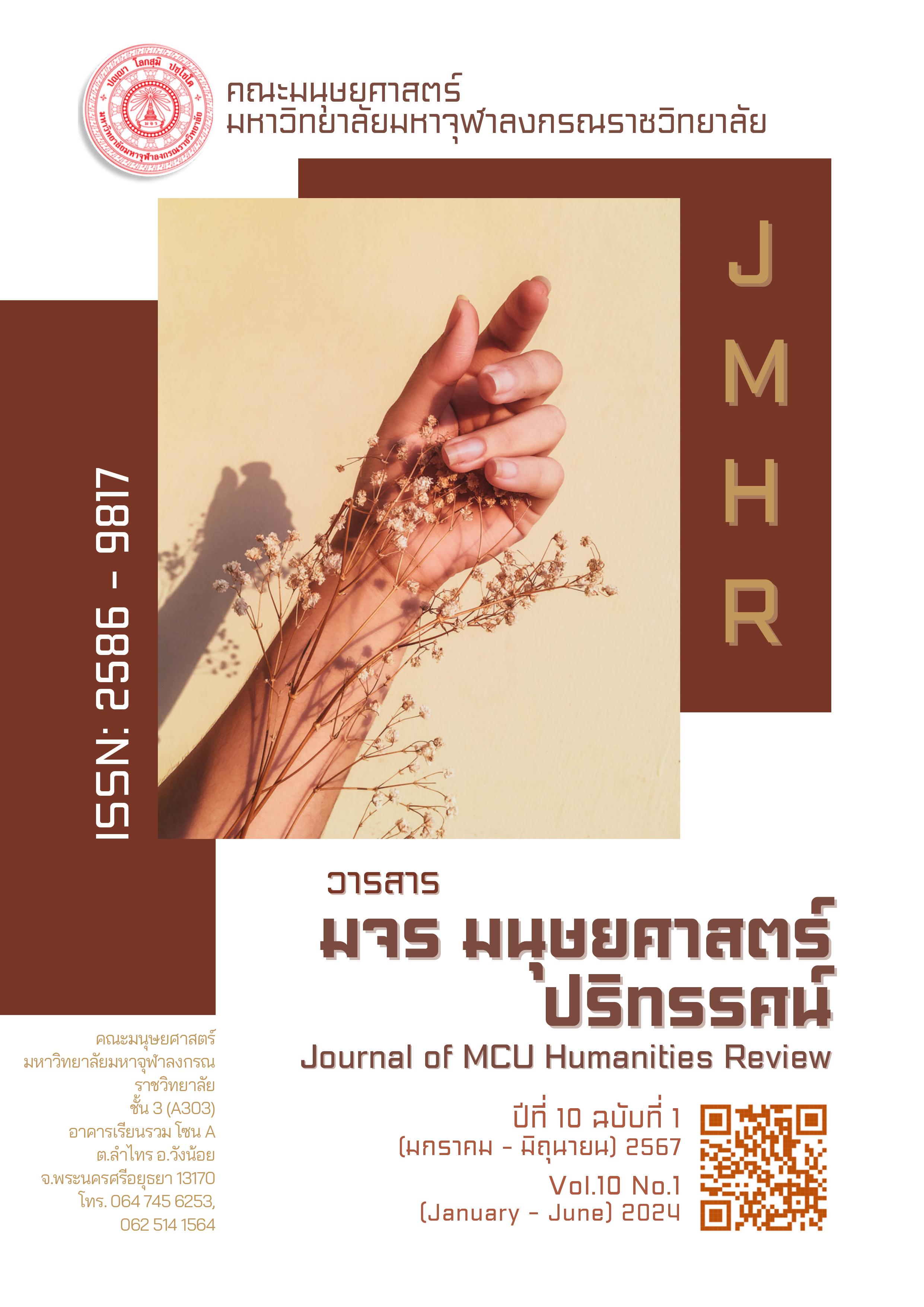มุมมอง : คุณลักษณะผู้นำองค์กรธุรกิจตามแนวพุทธจิตวิทยา ในยุคท้าทายหลังโควิด-19
คำสำคัญ:
ภาวะผู้นำ, คุณลักษณะผู้นำ, องค์กร, ธุรกิจ, พุทธจิตวิทยา, โควิด-19บทคัดย่อ
บทความนี้ผู้เขียนเสนอมุมมองเกี่ยวกับคุณลักษณะผู้นำองค์กรธุรกิจตามแนวพุทธจิตวิทยาในยุคท้าทายหลังโควิด-19 ในประเทศไทยการแพร่ระบาดของไวรัสโควิด-19 สร้างผลกระทบต่อสุขภาพและการใช้ชีวิตของผู้คนมากมาย ผู้นำองค์กรธุรกิจในยุคสมัยปัจจุบันจำเป็นต้องมีภาวะแห่งการนำที่ยืดหยุ่นและสอดคล้องกับภาวะผู้นําที่ประยุกต์ใช้หลักพุทธจิตวิทยาที่เหมาะสมเกี่ยวข้องกับหลักธรรมทางพระพุทธศาสนาเพื่อให้เป็นผู้ที่มีความสามารถในการปกครองตน ปกครองคน และปกครองงานได้แก่หลักธรรมพรหมวิหาร 4 สังคหวัตถุ 4 และอิทธิบาท 4 ซึ่งถือว่าเป็นหลักธรรมที่จําเป็นที่ผู้นำองค์กรจำต้องนำมาใช้ในการบริหารจัดการองค์กรนั้น เพื่อสร้างความสามัคคีปรองดองให้เกิดขึ้นในสังคมซึ่งเป็นหลักธรรมในการทำงานร่วมกันในองค์กร และอยู่ร่วมกันในสังคม การสร้างกระบวนการทำงาน มุมมองด้านการบริหารจัดการ มุมมองด้านการติดตามและประเมินผล ต้องมีการปรับตัวหรือปรับเปลี่ยนโครงสร้างของระบบบริหารงาน เพื่อให้องค์กรสามารถแข่งขันได้ ผู้บริหารต้อง มีความรู้รอบด้าน มีการสร้างระบบในการทำงาน มีกระบวนการทำงาน และมีการติดตามประเมินผลที่มีการเปลี่ยนแปลงอยู่ตลอดเวลา อีกทั้งจำต้องเพิ่มพูนความรู้ความสามารถอย่างต่อเนื่อง มุ่งสร้างผลงานให้มีประสิทธิภาพ เกิดประสิทธิผลและเหมาะสมกับบริบทของหน่วยงาน องค์กรธุรกิจของตนซึ่งมีความท้าทายในโลกธุรกิจเกิดขึ้นอยู่เสมอผู้นำในแต่ละองค์กรธุรกิจจะต้องหาวิธีและแนวทางการดำเนินงานที่เหมาะสมในแต่ละมิติ เพื่อให้ตอบโจทย์ขององค์กรและผู้บริโภคและสามารถดำเนินไปพร้อมกับกระแสโลกแห่งการเปลี่ยนแปลงเพื่อความยั่งยืนของความสำเร็จในอนาคตที่จะเกิดขึ้นหลังสถานการณ์แห่งความท้ายทายของโรคร้ายโควิด-19 ที่จางหายไปพร้อมกับการปรับตัวขององค์กรธุรกิจที่จำต้องเกิดขึ้นอีกมากมายต่อไป
เอกสารอ้างอิง
กรุงเทพธุรกิจ. (2563). "New Normal" คืออะไร? เมื่อโควิด-19 ผลักเราสู่ชีวิต "ปกติวิถีใหม่". สืบค้น 20 มีนาคม 2566, จาก https://shorturl.asia/UTXzj
นิธินันท์ สมบูรณ์วิทย์. (2565). เอคเซนเชอร์ชี้ “ผู้นำ” ยุคใหม่ ต้องกล้าปรับตัวและนำการเปลี่ยนแปลง. สืบค้น 10 กันยายน 2563, จาก https://shorturl.asia/9VLqx
ประเวศ วะสี. (2542). “ภาวะผู้นำสภาพในสังคมไทยและวิธีแก้ไขภาวะผู้นำความสำคัญต่ออนาคตไทย. กรุงเทพฯ : มติชน.
พรทิพย์ อัยยิมาพันธ์. (2563). บทบาท “ผู้นำ” ยุคโควิด “ต้องสร้างทุกคนให้เป็นผู้บริหาร”. สืบค้น 17 กันยายน 2566, จาก https://www.prachachat.net/csr-hr/news-523827
พระพรหมคุณาภรณ์ (ป. อ. ปยุตฺโต). (2550). ภาวะผู้นำ. กรุงเทพฯ : สุขภาพใจ.
วิไล ถาวรสุวรรณ. (2565). คุณลักษณะผู้นำเชิงกลยุทธ์ตามแนวพุทธจิตวิทยาในองค์กรธุรกิจเครือข่าย (วิทยานิพนธ์พุทธศาสตร์มหาบัณฑิต). มหาวิทยาลัยมหาจุฬาลงกรณราชวิทยาลัย. พระนครศรีอยุธยา.
วีระพงศ์ เกียรติ์ไพรยศ. (2560). การประยุกต์ใช้หลักธรรมพระพุทธสาศาสนาในการสร้างภาวะผู้นำของนักบริหาร. รายงานการประชุมวิซาการระดับซาติ ครั้งที่ 4 นานาชาติ ครั้งที่ 2. มหาวิทยาลัยมหาจุฬาลงกรณราชวิทยาลัย วิทยาเขตขอนแก่น.
“_______”. (2565). ภาวะผู้นำกับการบริหารองค์การในยุคนิวนอร์มัล. วารสารพุทธสังคมวิทยาปริทัศน์, 7(1), 743-753.
สำนักงานราชบัณฑิตยสภา. (2563). พจนานุกรมศัพท์นิเทศศาสตร์ ฉบับราชบัณฑิตสภา. กรุงเทพฯ : สำนักงานราชบัณฑิตยสภา.
Mackinsey. (2021). “What matters most?” Five priorities for CEOsin the next normal, How leaders can adapt to a very different future. สืบค้น 20 มีนาคม 2566, จาก https://shorturl.asia/eaPGK
McFarland, Dalton E. (1979). Management Foundations and Practices (5 th ed.). New York : Macmillan.
ดาวน์โหลด
เผยแพร่แล้ว
รูปแบบการอ้างอิง
ฉบับ
ประเภทบทความ
หมวดหมู่
สัญญาอนุญาต
ลิขสิทธิ์ (c) 2024 วารสาร มจร มนุษยศาสตร์ปริทรรศน์

อนุญาตภายใต้เงื่อนไข Creative Commons Attribution-NonCommercial-NoDerivatives 4.0 International License.






